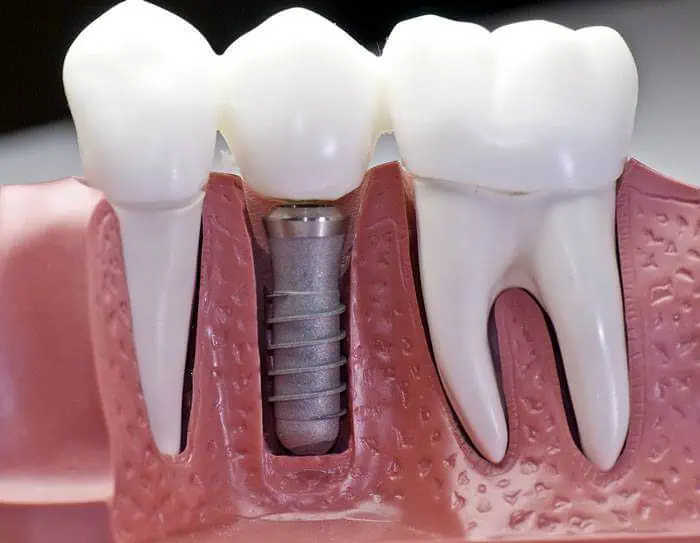In this article, we review your options for dental implant insurance. We took a close look at all of the variables that dental insurance that covers implants can have. This includes deductibles, annual maximums, premiums, and waiting periods, to name a few. From those we’ve chosen what we believe to be the best plans for implants:
We’ll also cover some alternatives to dental implant insurance, like payment plans, loans, and other options. But for now, read on to learn more about the best dental insurance that covers implants, and see a quick snapshot of our top picks in the list below:
- Best overall: Humana Extend
- Best high plan maximum: NCD Complete
- Best budget: Guardian Advantage Core
- Best no waiting period: Ameritas Dallas Smile Plan
- Best insurance alternative: Careington Dental Savings Plan
You can start comparing dental implants insurance plans now by going to Dentalinsurance.com. This user-friendly online marketplace makes it easy to search for dental insurance plans that also offer coverage for implants. They also have a friendly, licensed team of agents standing by if you need guidance. Just call 888-626-0057 with your questions.
Best dental implant insurance plans
Humana Extend


Our top pick for best dental insurance that covers implants is Humana. There are two Humana Extend plans that are recommended for dental implant insurance coverage — the 2500 and the 5000 Extend plans.
The 2500 Extend plan is designed to prevent problems before they happen. If problems do arise, with dental insurance that covers implants you can get the care you need, when you need it.
Highlights for the 2500 plan include:
- $1,000 annual maximum for implants per person
- $100 teeth whitening allowance per year
- 100% coverage of preventive vision and hearing exams once per year
- $2,500 annual maximum per person in general
This plan also includes all of your basic preventive dental services like:
- 2 oral exams per year
- 2 cleanings per year
- 2 fluoride treatments per year
- 1 comprehensive oral exam every 3 years
- 1 perio exam every 3 years
- 1 panoramic x-ray every 5 years
The Humana 5000 plan offers even greater benefits:
- $2,000 annual maximum for implants per person
- $5,000 annual maximum per person in general
Furthermore, with this Humana insurance that covers dental implants, the waiting periods can be waived for customers who have prior dental coverage. These are some of our top plans for dental insurance that covers root canals as well.
At dentalinsurance.com, you can compare Humana dental plans that cover dental implants.
NCD 5000


Our second pick for best dental insurance that covers implants are NCD plans, specifically the NCD 3000 and the NCD 5000 are great insurance plans for dental implants because they offer high plan maximums, and waiting periods can be waived if you can show proof of prior dental coverage.
You can even count partial prior coverage towards the waiting period.
There are low deductibles for both plans of just $50 per person per year, and that’s capped at a maximum of $150 per family.
The top benefits for this plan include:
As with many plans at this level, all preventive services are covered 100% with no waiting period, and care like panoramic x-rays, sealants, amalgams, and extractions are covered 80% with no waiting period.
Implants and other major restorative care like crowns and oral surgery are covered 50%, and again, there’s no waiting period if you have prior coverage. If you don’t, then there is a 12-month waiting period.
Both plans have a high annual maximum of $3,000, but with the NCD 5000, you can opt to buy up and get an additional $2,000, leaving you plenty of room to pay for an implant — maybe even two.
Find out more in our full NCD review.
Delta Dental implants


Delta Dental is another of our top picks for dental implant insurance. They offer coverage through two of their plans — Delta Dental PPO, and Delta Dental Premier.
With the PPO, you can visit any dentist of your choice, however, you will save more money if you go to an in-network provider. Your coverage is based on a percentage of the dentist’s fee for services provided.
Delta Dental Premier for implant coverage is a fee-for-service plan that also lets you visit any licensed dentist that you want, but by visiting an in-network dentist, Delta can ensure that you pay only your co-insurance percentage as specified by your coverage.
Top Benefits of Delta for Implants:
While Delta covers 100% of routine procedures, they cover 50% of major dental work like implants. There are downsides to these plans for Delta dental implants coverage. For instance, these plans have waiting periods, annual maximums and deductibles, and some policies don’t cover preexisting conditions, which include missing teeth.
That means that you can’t purchase this insurance for dental implants if you already have missing teeth.
Delta cautions that if you are enrolled in one of their implant coverage plans, you should always ask your dentist for a pre-treatment estimate before you begin treatment so that you’re clear on how much your Delta dental implant cost with insurance will be and how much the plan will cover.
Denali Dental Implant Insurance


Denali Dental Insurance offers comprehensive dental plans that provide coverage for implants and major dental services with up to a $6,000 annual maximum. Designed to cater to individuals, families, and seniors, Denali Dental plans allow for flexibility and convenience, including the freedom to choose any dentist. Notably, there are no waiting periods for preventive, basic, or major services, allowing for immediate access to necessary care. Additionally, Denali plans cover both child and adult orthodontics and offer up to four cleanings per year, making it a valuable choice for those seeking extensive dental support at an affordable price.
You can find Denali dental insurance for implants under their PPO plans, which include the Summit, Peak, and Ridge plans:
- Summit: The Summit plan covers 100% of preventative services and 30% for major services like implants during the first year. In the second year, it changes to 40% coverage, 50% in the third year, and 60% in the fourth year.
- Peak: The Peak plan offers 80% coverage for preventative services and 30% for major services in the first year, 40% in the second year, 50% in the third year, and 60% in the fourth year.
- Ridge: The Ridge plan offers 10% for preventative services and 10% for major services in the first year, 25% in the second year, 40% in the third year, and 50% in the fourth year.
The annual maximum for a Denali PPO is $6,000, which is quite a bit higher than many other plans offer. They also tend to keep deductibles rather low ($100 in some cases) so you don’t have to break the bank before coverage kicks in.
Cigna


Cigna offers dental insurance that covers implants and dentures, but only as group coverage purchased by an employer. The biggest benefit is that with these plans there are no annual maximums.
However, limits apply to implants, including that you can only have one surgical implant placed per year. Also, you can only replace a current dental implant once every 10 years. Not all Cigna group plans cover implants, so make sure you discuss this with your HR rep before starting treatment to make sure you fully understand the terms.
Compare plans now
Finding an affordable dental insurance plan that actually covers what you need can be frustrating — but don’t worry, we’ve got you covered. We made this easy-to-use plan comparison tool that shows you the best plans for implants in your area.
It takes just 10 seconds to fill out your details in the form below, so get started now!


Why is it hard to find dental implant insurance?
Finding the right dental implant insurance for you can be a difficult task, since these plans tend to have higher monthly premiums. Also there just aren’t that many plans that cover dental implants.
The primary difficulty with dental implant insurance plans is that they have high deductibles and low annual maximums. Many plans have maximums of around $1,000, which still leaves you potentially paying a lot out of pocket. They also usually have limits on how many implants you can get covered, and how often.
That explains why half of adults over the age of 65 don’t have dental insurance and only two-thirds of all Americans have private coverage.
It’s also a good reason to learn about other implant financing options; you can read our full guide to dental finance options.
Does dental insurance cover implants?
Many insurance companies don’t cover dental implants because implants are the most expensive option, so insurance companies choose to cover cheaper clinical procedures like crowns or dentures.
If you do find a plan that covers implants, your coverage will be partial, and you should make sure to take a good look at the conditions of the plan.


Many insurance policies have annual limits, and these limits usually aren’t nearly enough to cover implants. Most annual limits range from $1,000 to $1,500. Then consider that a single implant can cost anywhere from $1,500 to $6,000, so chances are, you’ll still be paying the bulk of the cost.
There’s also the fact that insurance companies limit treatment if you have preexisting conditions. So, that may mean that your policy won’t cover treatments for teeth missing before your policy begins. In this case, for your insurance to pay for implants you would have to lose your tooth while you already have the insurance.
Companies also make sure that you don’t buy insurance just because a tooth goes bad by having a 6- or 12-month waiting period from the time you sign up to the time your coverage kicks in.
Finally, there are the dreaded monthly premiums. Thankfully, they’re much lower for dental insurance than they are for health insurance, but for a plan that covers dental implants, you could pay up to $90 per month.
Why are implants so expensive?
A lot goes into placing dental implants. Implants themselves are made of three parts: the implant, the abutment, and the crown. And then there are the service costs you need to think of.
Some places claim they can offer you extremely cheap implants for $399, but these low-cost offers come with low-quality materials and less qualified medical professionals. If it seems too good to be true, it probably is.
In the video below, two dentists from Michigan explain exactly why implants cost what they do.
How much does a tooth implant cost with insurance?
The tooth replacement cost with insurance can be anywhere from 50% to 80% of the cost without insurance, and in some cases, your insurance company might only cover 10% of the cost. Also, don’t forget that there’s an annual limit that may very well be below the cost of your implants. So the implant cost with health insurance could still be quite high.
As we mentioned above, without full dental insurance, your implants could cost anywhere from $1,500 to $6,000 for a single implant. The cost varies so much because the price of your dental implants will depend on many factors, including:
- The condition of your gums and teeth
- Your oral health in general
- Your jawbone density
- Whether you need additional surgery
- Whether you need upper or lower implants
- The type of implant you get
- Your location
That being said, you can use our dental implant price calculator to get an idea of what you might have to pay:
Total estimated cost
Save up to 50% with implant insurance Click here for more details
How to find dental insurance that covers implants
If you are wondering how to get dental implants covered by insurance, and what dental insurance plan covers implants, the first steps are easy enough. You can go to Dentalinsurance.com, the online marketplace that lets you search for the best dental insurance plans in your area.
Just click the link below and enter your zip code and date of birth to get started.
While you’re browsing the marketplace, you’ll also find short videos with helpful tips for finding the best dental insurance plan for you. Plus, you can call 888-626-0057 to speak with one of their helpful licensed agents.
Dental insurance that covers implants for missing teeth
If you’re looking for dental insurance that covers implants for missing teeth, there are some full-coverage dental plans out there that provide 50 to 80% coverage on implants. Some of these plans include:
- Delta Dental Premier
- Denali PPO plans
- Cigna employee plans
You may also consider dental savings plans (payment plans) which aren’t insurance, but allow you to receive discount care, including implants, with no waiting period, no deductibles, and no annual maximums.
You can search for both dental insurance plans and dental discount plans for implants for missing teeth with Dentalinsurance.com.
Alternatives to dental implant insurance
The table below shows some of the best options for implant financing, along with dental insurance, including dental discount plans, dental loans, and dental tourism.
You can also read about more options in our guides for dental payment plans and dental implant grants.
If you would like to find out about other ways to find affordable dental care, you can read our guides on free dental implants and finding a cheap dentist without insurance.
Conclusion
There are some companies that offer insurance that covers dental implants, and for some people, implant insurance is the best way to save on this expensive but necessary procedure.
The disadvantages of dental insurance plans for implants, however, are that they often have high deductibles, low yearly maximums, and limitations for preexisting conditions, including if you have missing teeth. You can read more about insurance plans that cover major treatment in our separate article here.
It’s worth searching for an affordable dental insurance plan that covers implants, but if you can’t find one, you can consider alternatives like payment plans, discount plans, or personal dental loans for implants.
If you need help to find a dental insurance plan or a discount plan, for implants and for other dental work you can go to DentalInsurance.com and compare the best plans in your area. And if you find one you like, you can enrol directly.
FAQs
There are some dental insurance plans for implants with no waiting period, however, these plans don’t cover implants for teeth that are missing prior to having a policy.
Cigna has plans that provide coverage for dental implants, but only as a group plan purchased by your employer. These plans have no annual maximums but may have other limitations. Confirm with your HR representative before you enroll.
Some insurance companies do offer plans that cover dental implants. But many don’t and the ones that do often have strict limitations. This is because implants are an extremely expensive procedure. They aren’t always cost-effective for dental insurance plans to cover.
On average, the dental implant cost with insurance ranges from $500 to $3,000 per implant.
Uofmhealth.org: With half of adults over 65 lacking dental insurance, poll finds strong support for universal Medicare dental benefit. Consulted 21st September 2020.
Uofmhealth.org: With half of adults over 65 lacking dental insurance, poll finds strong support for universal Medicare dental benefit. Consulted 21st September 2020.




